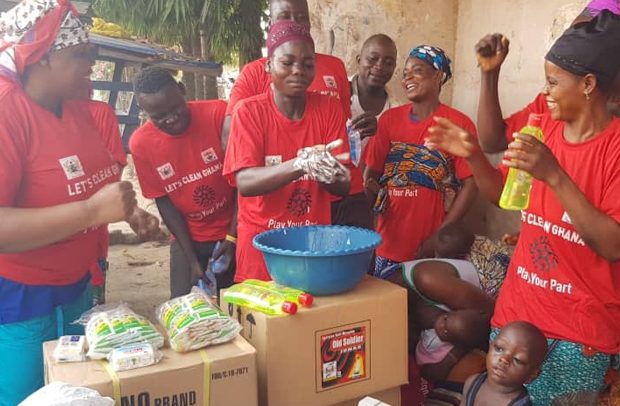A Kayayo carrying out a demonstration as colleagues looked on
Some head porters popularly known as ‘Kayayei’ at the Mallam Atta Market in Accra on Sunday, December 6, 2018, benefitted from a hand-washing sensitisation campaign organised by Mandogue Foundation, a non-governmental organisation (NGO).
The activity, which was under the theme: “Reach out to Kayayei,” was aimed at educating the porters who were mostly made up of women and teenage girls on common hygienic practices such as the importance of handwashing and how to properly perform it.
Items such as clothes, mosquito repellents and coils and detergents were also presented to the ‘Kayayei’.
A beneficiary of the campaign – Zahra Ibrahim – who was appreciative of the gesture also called on stakeholders to pay more attention to the living conditions of ‘Kayayei’ which were deplorable, making them vulnerable.
“It is because of poverty that we are here. If not, there was no way as humans we would have come to sleep here and compromise our safety and health,” she said.
Sharing her ordeal as a woman who sleeps on the street, she said that the head porters were always at risk of being attacked by ‘predators’ such as rapists, robbers and money ritualists, who prey on their offspring.
“There are times when these ‘sakawa’ boys come around with their cars to pick our children. We have to raise the alarm and cry out before they go away,” she added.
The Founder of the NGO, Humu Dilley Saeed, also lamented over the inability of such women and girls to access basic rights to good education and shelter as a result of poor living conditions.
She indicated that the situation where “babies carried babies”, in reference to young girls nurturing babies, should be of major concern to all stakeholders.
Mrs Saeed who is also the assembly member for Ofankor Electoral Area has therefore suggested the need for better accommodation to be provided for head porters as a temporary measure while the government expedites his ‘one district one factory’ policy.
She said the policy when fully executed in the northern regions would help reduce the influx of such vulnerable groups to the urban centres.
“It is work that has brought them here so they shouldn’t be vulnerable; security wise they should be safe,” she added.
She also called on organisations to support her philanthropic work in order to help improve the lives of the less fortunate in the society.
By Issah Mohammed


